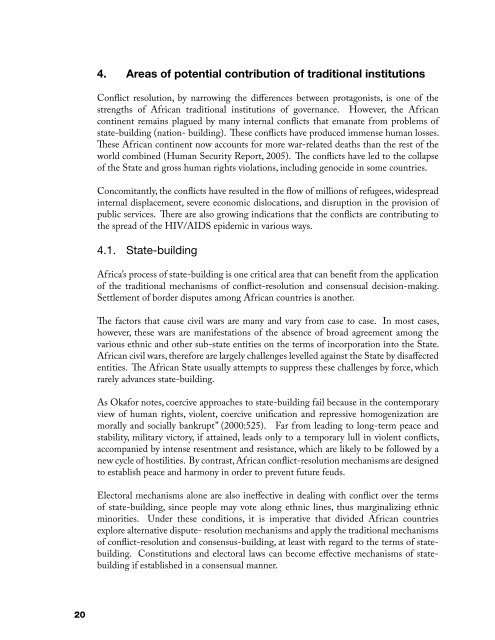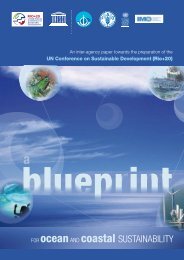Relevance of - United Nations Economic Commission for Africa
Relevance of - United Nations Economic Commission for Africa
Relevance of - United Nations Economic Commission for Africa
Create successful ePaper yourself
Turn your PDF publications into a flip-book with our unique Google optimized e-Paper software.
4. Areas <strong>of</strong> potential contribution <strong>of</strong> traditional institutions<br />
Conflict resolution, by narrowing the differences between protagonists, is one <strong>of</strong> the<br />
strengths <strong>of</strong> <strong>Africa</strong>n traditional institutions <strong>of</strong> governance. However, the <strong>Africa</strong>n<br />
continent remains plagued by many internal conflicts that emanate from problems <strong>of</strong><br />
state-building (nation- building). These conflicts have produced immense human losses.<br />
These <strong>Africa</strong>n continent now accounts <strong>for</strong> more war-related deaths than the rest <strong>of</strong> the<br />
world combined (Human Security Report, 2005). The conflicts have led to the collapse<br />
<strong>of</strong> the State and gross human rights violations, including genocide in some countries.<br />
Concomitantly, the conflicts have resulted in the flow <strong>of</strong> millions <strong>of</strong> refugees, widespread<br />
internal displacement, severe economic dislocations, and disruption in the provision <strong>of</strong><br />
public services. There are also growing indications that the conflicts are contributing to<br />
the spread <strong>of</strong> the HIV/AIDS epidemic in various ways.<br />
4.1. State-building<br />
<strong>Africa</strong>’s process <strong>of</strong> state-building is one critical area that can benefit from the application<br />
<strong>of</strong> the traditional mechanisms <strong>of</strong> conflict-resolution and consensual decision-making.<br />
Settlement <strong>of</strong> border disputes among <strong>Africa</strong>n countries is another.<br />
The factors that cause civil wars are many and vary from case to case. In most cases,<br />
however, these wars are manifestations <strong>of</strong> the absence <strong>of</strong> broad agreement among the<br />
various ethnic and other sub-state entities on the terms <strong>of</strong> incorporation into the State.<br />
<strong>Africa</strong>n civil wars, there<strong>for</strong>e are largely challenges levelled against the State by disaffected<br />
entities. The <strong>Africa</strong>n State usually attempts to suppress these challenges by <strong>for</strong>ce, which<br />
rarely advances state-building.<br />
As Oka<strong>for</strong> notes, coercive approaches to state-building fail because in the contemporary<br />
view <strong>of</strong> human rights, violent, coercive unification and repressive homogenization are<br />
morally and socially bankrupt” (2000:525). Far from leading to long-term peace and<br />
stability, military victory, if attained, leads only to a temporary lull in violent conflicts,<br />
accompanied by intense resentment and resistance, which are likely to be followed by a<br />
new cycle <strong>of</strong> hostilities. By contrast, <strong>Africa</strong>n conflict-resolution mechanisms are designed<br />
to establish peace and harmony in order to prevent future feuds.<br />
Electoral mechanisms alone are also ineffective in dealing with conflict over the terms<br />
<strong>of</strong> state-building, since people may vote along ethnic lines, thus marginalizing ethnic<br />
minorities. Under these conditions, it is imperative that divided <strong>Africa</strong>n countries<br />
explore alternative dispute- resolution mechanisms and apply the traditional mechanisms<br />
<strong>of</strong> conflict-resolution and consensus-building, at least with regard to the terms <strong>of</strong> statebuilding.<br />
Constitutions and electoral laws can become effective mechanisms <strong>of</strong> statebuilding<br />
if established in a consensual manner.<br />
20
















